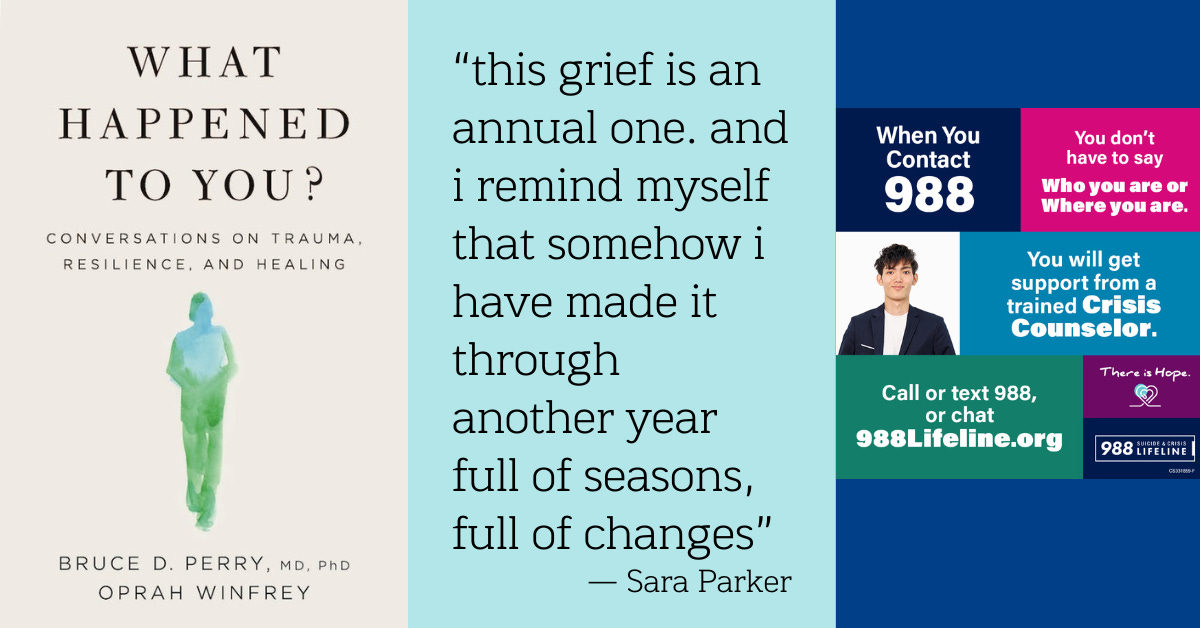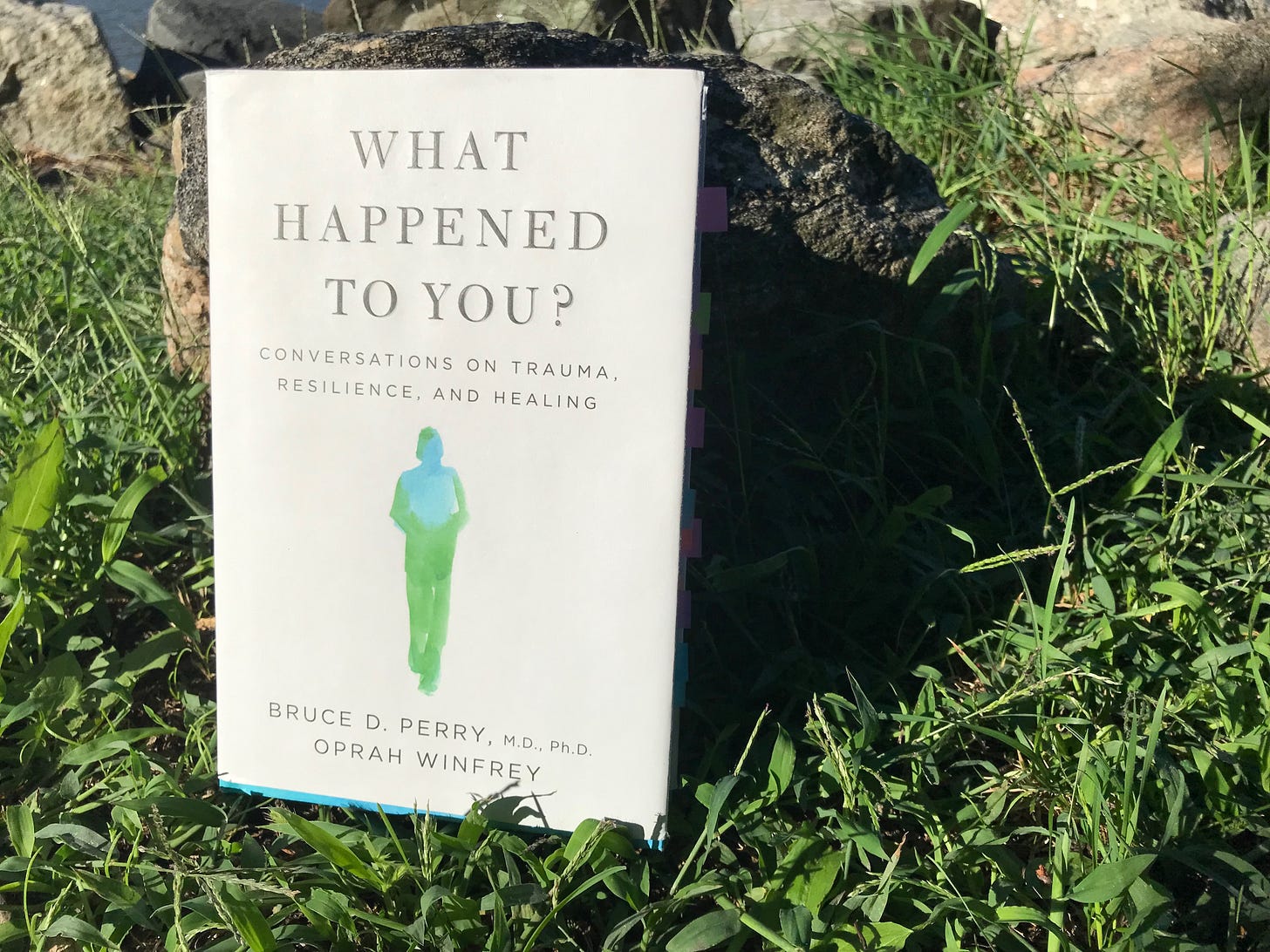Field Notes #32: "Our brain is organized to act and feel before we think."
New 988 hotline across America, illuminating passages about PTSD from Sara Parker, and a book recommendation for understanding trauma and the human body
Hello, friends! Happy Wednesday! It’s time for Field Notes, three interesting things I’ve run across lately. September is National Suicide Prevention Awareness Month, but truly every month is a good month to talk about mental health and how to help. (What a truism — if it’s good enough for a month, it’s great for all 12 months.) Today’s Field Notes has 3 items all in this realm. I hope they are helpful. (If thinking about PTSD, suicide prevention or trauma and resilience is not what you need to read today, I understand. Here’s a lighter Field Notes #12 to read instead. Dive into all of the archives here.)
1} New national hotline: 988
Let’s start with a practical tip. Until this July, if you needed to call the National Suicide Prevention Hotline, you needed a full phone number: 1-800-273-TALK.
But now, 24/7, anywhere in America, you can dial 988 to reach crisis counselors trained in helping people in mental health-related distress. This could be thoughts of suicide, substance-use crisis, or any kind of emotional distress.
You can also text 988 to reach a crisis counselor.
Help spread the word!
2} “A glimpse into healing complex PTSD”
When I began to read my lovely friend Sara’s most recent post in her Road Trip with Sara Parker newsletter, chronicling how daylight is shortening, a sadness crept over me, too. Are you feeling this where you live?
She writes:
i failed to appreciate this part of the summer most: that the days are long and the sun is up before i rise and falls after i rest each day. i forgot that this changes and assumed that it would stay static through the months that followed. the sun returning to the top of the sky feels like a hyperbaric chamber each year. the season change, and the fading daylight, feels like returning to the real world after living in such an oxygen rich environment. this grief is an annual one. and i remind myself that somehow i have made it through another year full of seasons, full of changes.
it’s easy to feel alone in this feeling — that i’m the only person in the world who feels grief for passing seasons. the ego is a funny concept. it isolates us. tries to make us believe that our pain is only ours, that our fear is only ours, with a fierce belief that, as joan didion put it: “nothing like this, all evidence to the contrary notwithstanding, has ever happened before.”
Then Sara steers us into a different direction, a spiral of what it feels like to experience a panic attack and locate a handhold of relief in human connection.
After all, this startling, exquisite post is titled:
i forgot that summer ends
and a glimpse into healing complex PTSD
Here is a tiny excerpt, as Sara describes reaching land after an open water swim:
once on shore, a panic attack loomed on the horizon. i felt my chest tighten. i knew i had become removed from my body. time slowed and crept and crawled and it felt like i was in a fish bowl, unable to interact with the outside world.
when i’m having a panic attack, i feel absolutely alone. i feel like crawling on the ground and tucking myself into the smallest possible ball, i feel like there will be no happiness now or in the future, i feel like the world is filled with only sadness, i feel like i will never be liked or loved again.
the words come out of my mouth in choppy spurts. my movement slows. i can only focus on one thing now, and that thing is either going to be my impending doom or the sound of a voice that i trust.
I really recommend the entire post. I feel like I understand more fully, more within my whole body, what a panic attack might feel like, and how I might support a friend. I feel grateful for Sara for sharing this. (Thank you, Sara!)
3} Conversations on trauma: A book recommendation
One of the best, most approachable, insightful books I’ve read about trauma is What Happened to You? Conversations on Trauma, Resilience, and Healing by Dr. Bruce D. Perry and Oprah Winfrey. It’s set up as a conversation between the two, which makes it more captivating than a straight textbook. I pulled it out my copy this morning, which was strew with colorful page markers. (I had read it originally when I compiled the Gold Foundation’s 2021 Reading List of Compassionate Clinicians).
Here is just one nugget from a book that is overflowing with them: the model of the brain, an explanation of how information enters our body and how we process it is — why we have a strong physical reaction before our brain works through the context of what is going on.
The systems at the top, explains Dr. Perry, are “responsible for speech and language, thinking, planning; our values and beliefs are stored there. And, very important for you, this is the part of the brain that can ‘tell time.’” At the bottom of the brain is the brainstem, which “controls less, mostly regulatory, functions like body-temperature regulation, breathing, heart rate, and so forth. But there are no networks in the bottom part that think or tell time.”
He continues:
“Input from all of our senses—vision, hearing, touch, smell—first comes into our brain in the lower areas. None of our sensory input goes directly into the cortex; everything first connects to lower parts of the brain.”
Dr. Perry explains that when a signal comes into the brainstem, it is processed and matched up with past experiences. So when firecracker sounds like gunfire from war, for example, the body processes it immediately in the same way.
“The sequential processing means that the most primitive, reactive part of our brain is the first to interpret and act on the information coming from our senses. Bottom line: Our brain is organized to act and feel before we think.”
He continues later:
“Not only is ‘What happened to you?’ The key question if you want to understand someone, it is the key question if you want to understand the brain. In other words, your personal history—the people and places in your life—influences your brain’s development.”
“For example, when children have abusive fathers, their brains begin to connect men with threat, anger, and fear. And this worldview gets built in—men are dangerous, threatening, they will hurt you and the people you live. If that is your ingrained view of the world, imagine what happens when you have a male teacher or coach. Imagine how you will view a new, healthy, non-abusive man in your mother’s life.”
This book was so helpful in helping me understand better how human bodies work. If you read it, I’d love to know what you think, too.
I hope you have a wonderful week ahead full of awareness, epiphanies, and connection.
To our journeys,
Brianne








Thanks so much for adding in my dispatch to today's Field Notes, Brianne! A true honor. I'm grateful to know you and to be inspired by your leadership on topics like this :)
Thankyou for these suggestions. I will go read Sara's stack. Winter can definitely effect those of us with chronic conditions negatively, I dread the short, dull days.